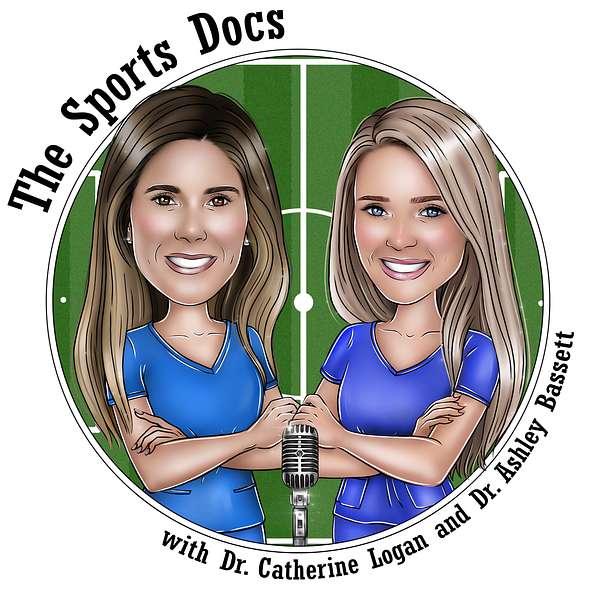
The Sports Docs Podcast
Sports medicine is a constantly evolving field, with hundreds of new articles published each month on the topic. This ever-growing wealth of information can make it challenging to stay updated on the newest approaches and techniques, and to know which data should actually change your practice. Join orthopedic surgeons, Dr. Catherine Logan and Dr. Ashley Bassett, as they chat about the most recent developments in sports medicine and dissect through all the noise.
On each episode of The Sports Docs podcast, the hosts will tackle a specific injury – from ACL tears to shoulder instability – and review the top research from various high-impact journals that month, including The American Journal of Sports Medicine, Arthroscopy: The Journal of Arthroscopic and Related Surgery, Sports Health, Journal of Shoulder and Elbow Surgeons, and more. The Sports Docs will also be joined by experts in the field of sports medicine – orthopedic surgeons, nonoperative sports medicine specialists, athletes, physical therapists, athletic trainers and others – to provide a fresh and well-rounded perspective based on their unique experiences.
The Sports Docs – Dr. Logan & Dr. Bassett – are friends & former co-residents from the Harvard Combined Orthopaedic Residency Program, who went onto esteemed sports medicine fellowships at The Steadman Clinic and The Rothman Institute, respectively. Dr. Logan practices in Denver, CO, and serves as Team Physician for Men's USA Lacrosse & as a Team Physician for U.S. Ski & Snowboard. Dr. Bassett is the director of the Women’s Sports Medicine Center at the Orthopedic Institute of New Jersey and practices across northern NJ, primarily in Morris and Sussex Counties.
Together, they will bring monthly conversations on how to care for athletes of all ages and levels of play, with a healthy mix of cutting-edge science and real-world application.
The Sports Docs Podcast
31. LIVE from AAOS with Dr. Brian Waterman: Hip Arthroscopy for FAI in Older Adults
We’re coming to you live from the American Academy of Orthopaedic Surgeons annual meeting in Las Vegas, our largest orthopaedic conference. This year, over 20,000 orthopedic professionals gathered at the AAOS meeting to take part. The educational program is comprised of instructional course lectures, video theater, live surgeries, podium presentations and research posters.
Over the next several episodes we’re going to be reviewing five sports medicine posters that were presented at the AAOS meeting. On this podcast we try to review the most updated literature on different sports medicine topics. So, reviewing some of the posters that were just presented at AAOS is particularly exciting for us because this is very new data. So new that most of this data has not even been published yet.
We’re joined by Dr. Brian Waterman to get his take on these poster presentations.
Dr. Brian Waterman is a board-certified, orthopedic surgeon specializing in adult and pediatric sports medicine, cartilage restoration and joint preservation, complex knee surgery and shoulder and elbow care. He is the Chief of sports medicine at Wake Forest University and the Director of their sports medicine fellowship program. Dr. Waterman completed his orthopedic surgery residency at William Beaumont Army Medical Center and served 13 years in the U.S. Army, earning multiple honors including the Meritorious Service Medal and Army Commendation Medal.
Dr. Waterman then went on to complete a sports medicine fellowship at Rush University Medical Center in Chicago. He is the team physician for Wake Forest University, the Winston-Salem Dash, U.S. Ski and Snowboard and several local high schools.
Dr. Waterman is an associate editor for the Arthroscopy Journal and is on the Board of Directors for Arthroscopy Association of North America. Given his extensive experience with orthopedic research, Dr. Waterman led the sports medicine poster tour at AAOS this year, so we’re looking forward to getting his unique perspective on these poster presentations.
Featured Poster:
Older Adults Take Longer to Achieve the Patient Acceptable Symptom State following Primary Hip Arthroscopy for Femoroacetabular Impingement: A Retrospective Analysis with 2-Year Follow-Up.
Thomas Youm and team found that patients in the oldest cohort, between 50-75 years of age, had significantly longer time to PASS than those in the youngest group, even after adjusting for sex and BMI.